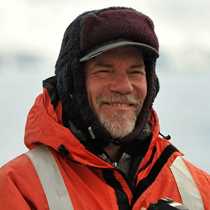Here’s a question: You’re in the Antarctic and you see something unfamiliar and amazing (this tends to happen every couple of minutes); is it a life-changing experience or valuable data? And here’s the answer: YES!
Expedition travel is all about being there – being in a beautiful region, being out on deck, being up early or late – and soaking it all in. In fact, this is the essence of the study of natural history: paying attention, thinking carefully about one’s experiences and, most of all, being present. This is the great and beautiful difference between our experiences in the wilderness and even the very best wildlife television shows and movies. It’s not scheduled, it won’t be repeated; it’s an educational intersection of our lives with the lives of wild creatures and the times of wild places. These moments are valuable in many ways. They are spiritual, giving us the perspective to see our lives in a broader context. And they are often important scientifically, expanding and deepening our understanding of the world.
On this journey we have had the thrill of watching a pod of killer whales glide among the bergs of the Weddell Sea, and we were able to photograph them for identification – increasing the known catalogue of Type “A” Antarctic orca by 25%! We have laughed at the antics of penguins, conducted one-sided conversations with them and helped to continue a long-term census of their colonies, a vital tool for guiding their conservation. We have recorded a previously unknown vocalization by a crabeater seal and marveled at their lives, at home and at ease in the frozen ocean world of the pack ice.
Today, at sea between the South Orkneys and South Georgia, we encountered a group of fin whales, accompanied by a pair of blue whales! These are both magnificent creatures, respectively the second largest and largest of all whales. Rising through the steel grey waves, their blows tearing away in the wind, they were an incredible sight. But the blue whales were much more than that; driven to the brink of extinction during the heyday of industrial whaling, they are still surpassingly rare in these waters. Every record of blue whales in the Southern Ocean is valuable as evidence of their slow recovery. Every sighting is an occasion for jubilation, a reason to hope for the future of the Antarctic, another opportunity to delve into its mysteries and to rejoice in its beauty.




